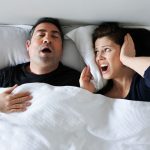If you’re not familiar with pink noise, it consists of soothing, natural sounds – like rain falling, ocean waves breaking or leaves rustling in the trees. I like to use pink noise to help me sleep when I travel, because it masks distracting sounds that might otherwise keep me awake.
Interestingly, this type of sound increases slow brain wave activity, so you end up sleeping more deeply than you normally would. But there’s more to it than that.
Researchers in Zurich find that stimulation with a series of pink noise tones cause the left ventricle of the heart to contract and relax more efficiently. This, in turn, improves blood flow; improving heart function and bringing more oxygen-rich blood to all of your organs.
The results were so clearly measurable after just one night of stimulation that the research team was surprised. “We clearly saw that both the heart’s pumping force and its relaxation were greater after nights with stimulation compared to nights without stimulation,” says Christian Schmied, one of the authors of the study.
This is great news for your heart, kidneys, liver and even your brain health. And it makes a lot of sense.
After all, we’ve known for a long time that shorter durations of deep sleep increase inflammation levels, boost your risk of a stroke or heart attack, raise your chances of diabetes, throw your hunger hormones out of balance, promote depression and increase your risk of Alzheimer’s disease and dementia.
💤🧠Not Getting Enough Sleep Destroys Your Brain Health
One of the scariest conditions associated with decreased deep slow wave sleep is dementia.
You see, your brain has a “drainage” system (the glymphatic system) that flips on when you fall asleep. This all-important system floods cerebral spinal fluid through brain tissue to wash away the oxidative garbage accumulates during the day, including early beta amyloid build up and tau protein tangles.
But if you’re not getting enough sleep – or enough deep sleep – these toxic substances will accumulate in your brain, increasing your risk of Alzheimer’s and dementia.
However, when older adults have high quality sleep wave activity, it actually improves mental function.
This is a reminder of how important it is to make every effort to get a full seven to eight hours of high-quality sleep every night. Luckily there are some strategies you can use to help you sleep well, night after night.
🌙Healthy Habits for a Good Night’s Sleep
Get some outdoor activity every day. Physical activity will help wear you out. The more outdoor activity you get, the better your results will be. This is true regardless of what type of physical activity you participate in, or even the intensity of it.
Get high energy projects out of the way early in the evening. The longer you keep moving, the longer it will take to fall asleep.
Avoid caffeinated or sugary beverages after lunchtime. You may think you’re immune to their stimulating effects… but that’s just wishful thinking.
Skip high-protein foods at your evening meal. They contain tyrosine, which triggers the release of dopamine and norepinephrine. These are both stimulants that promote alertness and activity that can interfere with sleep. It’s better to fill your last meal of the day with non-starchy, organic veggies from all colors of the rainbow.
Watch out for junk food and alcohol. Both of these will cause the quality of deep, slow wave sleep to decline, thus disrupting all of the body processes that occur while you sleep.🍸
Keep to a sleep schedule. If your sleep schedule is erratic, your body won’t know when it’s time to power down. Develop a regular sleep pattern by hitting the sack at the same time each night and getting up the same time each morning.
Make your bedroom a sleep-friendly environment. Your room should be cool and well ventilated. Make sure to shut down all electronic devices and dim the lights about an hour before bedtime to create a quiet atmosphere.
Turn on some pink noise. Not only will it mask distracting noise, it will also help you get into health regenerating deep slow wave sleep.
Seek the sunshine when you wake up. The bright light will remind your body that it’s daytime, which works to reset your natural circadian rhythm. The sun also helps your body produce vitamin D, which has a direct effect on sleep regulation.✨
If you’re having a hard time re-setting your natural sleep cycle, take 3 to 4 mg of melatonin about an hour before bedtime. If you’re new to taking melatonin, begin at 1 mg and build up to 3 or 4 mg.
Priming yourself to get seven to eight hours of restorative deep sleep isn’t just about feeling rested. It’s about protecting your heart, preserving your brain, and keeping every organ in your body running smoothly.
SOURCES:
Huwiler S, Carro-Domínguez M, Stich FM, Sala R, Aziri F, Trippel A, Ryf T, Markendorf S, Niederseer D, Bohm P, Stoll G, Laubscher L, Thevan J, Spengler CM, Gawinecka J, Osto E, Huber R, Wenderoth N, Schmied C, Lustenberger C. Auditory stimulation of sleep slow waves enhances left ventricular function in humans. Eur Heart J. 2023 Oct 21;44(40):4288-4291.
Himali JJ, Baril AA, Cavuoto MG, Yiallourou S, Wiedner CD, Himali D, DeCarli C, Redline S, Beiser AS, Seshadri S, Pase MP. Association Between Slow-Wave Sleep Loss and Incident Dementia. JAMA Neurol. 2023 Dec 1;80(12):1326-1333.
Zavecz Z, Shah, VD, Murillo, OG, Vallat, R, Mander, BA, Winer, JR, Jagust, WJ, and Walker, Matthew, P. NREM sleep as a novel protective cognitive reserve factor in the face of Alzheimer’s disease pathology. BMC Medicine. May 2023; 21(1).
Lee YF, Gerashchenko D, Timofeev I, Bacskai BJ, Kastanenka KV. Slow Wave Sleep Is a Promising Intervention Target for Alzheimer’s Disease. Front Neurosci. 2020 Jun 30;14:705.
Brandão LEM, Popa A, Cedernaes E, Cedernaes C, Lampola L, Cedernaes J. Exposure to a more unhealthy diet impacts sleep microstructure during normal sleep and recovery sleep: A randomized trial. Obesity (Silver Spring). 2023 Jul;31(7):1755-1766.
Gardiner C, Weakley J, Burke LM, Roach GD, Sargent C, Maniar N, Huynh M, Miller DJ, Townshend A, Halson SL. The effect of alcohol on subsequent sleep in healthy adults: A systematic review and meta-analysis. Sleep Med Rev. 2025 Apr;80:102030.



